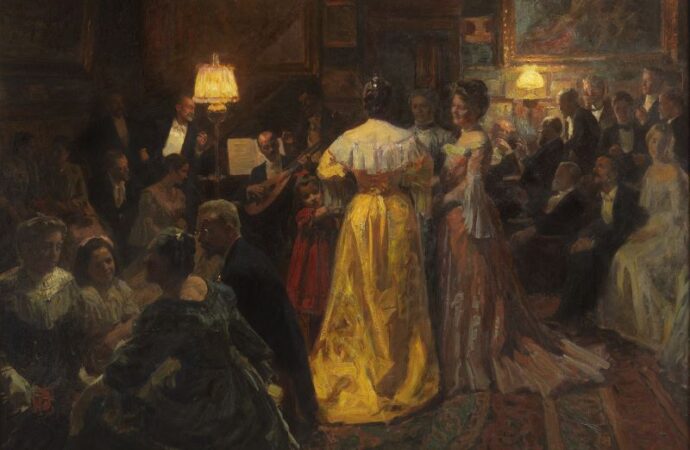Let me begin this brief reflection with a testimonial. Culture is the motive that gives me joy from one day to the next, the reason I get up each morning. And what do I mean by culture? Let me attempt to articulate my precise understanding of this much used (and abused) term.
Culture, for me, is the entire spectrum of human accomplishment and values as cultivated and passed on to others. As a synonym for culture, the phrase “human flourishing” (a concept as old as Aristotle) comes to my mind. Another phrase I have found in an essay by an Imaginative Conservative contributor, “the demanding cultivation of the human mind and soul,” also works nicely as a definition. I note that one of the first definitions of culture came from the English anthropologist Edward Burnett Tylor in 1871: “Culture … is that complex whole which includes knowledge, belief, art, morals, law, custom, and any other capabilities and habits acquired by man as a member of society.”
More often than not we speak of culture in its communal, societal aspects, as Tylor did. But what of culture as a personal phenomenon? Because to my way of thinking, while culture certainly signifies the flourishing of a society or civilization as a whole, it also signifies the flourishing of the individual. In this way we can begin to speak about the sense in which an individual may be said to possess a culture or to live by culture. It is culture as a personal possession and a grounding of an individual’s life—and indeed the thing that gives life a good deal of its meaning—which I would like to reflect upon here. What I had in mind to write is, if you like, an existential or personalistic essay about culture—whether I will achieve this is another matter, but I am at any rate essaying (trying).
I tend more and more to see culture as a refuge and a source of meaning and value, even the source of one’s own sense of self. I tend to consider culture in the sense that Matthew Arnold defined it: “an inward condition of the mind and spirit.” Inward and personal, not outward and social. Culture as a fruit of learning and experience, a state of being in which one constructs one’s own (perhaps continually renewing and expanding) pantheon of great creators, thinkers, and works. A cultural atmosphere, formed according to one’s personal taste, can then pervade one’s life and radiate outward to others.
One of the reasons I feel compelled to pursue this theme, this particular emphasis, is that today the person seeking to be cultured finds himself increasingly lonely, adrift and without social support in a world preoccupied mostly with news and politics. We who try to pursue culture must do so pretty much on our own, without the kind of institutions and shared interest that fostered culture in the past.
I for one have found this to be the case. Although I was brought up in a cultured home and had some good teachers to set me on the right path, for me the path to acquiring culture has been largely an individual one. I have always been a person off by himself, thinking and studying and trying to figure things out on his own. Self-directedness has been bred in me from an early age. In school, outside of schoolwork, I have chosen my own reading and followed where it led me. I had a good university education, but its real significance for me is not in having been an end but in having been a beginning; it started me off on a road of learning which I continue to walk. My “real” education, I like to say, began after school was done and I was able to feed my mind with more history, criticism, philosophy, theology.
Of course, I have been fortunate to have fallen into a profession (writing) which allows me to devote myself to study and reflection. Yet unlike some writers who are attached to an educational institution or the like, I am a freelancer, an unaffiliated observer of life. Having few attachments and little sense of belonging, my dedication to culture has become the justification for my life.
Joseph Epstein, the erudite and cultured essayist, has described his education as “slapdash, wildly uneven, and chiefly autodidactical”; to this he adds that “we are all finally autodidacts.” And to that I can only say Amen.
Now, my entire life I have been reading about the decline of culture, the death of culture, the deterioration of values, and the like. Aside from making me feel as if I’ve been living in a mausoleum all my life, such commentary has made me ever more aware of an essential aloneness in divining the meaning of life and pursuing culture by one’s own lights.
We human beings are caught in an odd in-between state. If we search within us, we will see that it is true, and there are plenty of great thinkers to back it up. We have before us the world of nature and phenomena, the facts of life and death. Yet we sense in our bones that there must be something more and higher than what we can see or sense. There is another, higher reality, and we can get glimpses of it through such activities as artistic creation, scientific study, philosophical reflection, and religious worship. The term culture denotes these realities viewed under the aspect of practices or ways of life that are cultivated, preserved, and shared.
Culture is thus the conveyer of meaning. On other occasions I’ve reflected on reality as viewed under such aspects as beauty (the pleasing aspect of truth) and art (a human sharing in the splendor of creation). As a concept naming one dimension of human reality, culture has the advantage of subsuming under one umbrella all human activity and practices in the service of truth, goodness, and beauty.
One interesting fact about the word “culture” is that nobody used it much before the 19th century. That a term is relatively recent in origin, of course, does not make it invalid; we are not duty-bound to use precisely the vocabulary that, say, Thomas Aquinas used. As culture (there I go again) evolves, we develop to new words to describe and point to particular realities; and “culture” seems to me an entirely viable way to name a whole host of human realities.
As conservatives we believe in objective truth; but truths must be personally appropriated by each individual, must be lived in a way attuned to each personality. Do you have certain tastes, interests, passions? Culture can and must be a pursuit with an individual stamp.
There is much writing in conservative circles about education of the young; but what about the education that happens after formal education is finished—the continuing cultivation of the mind and soul on the part of thoughtful human beings?
The problem as I see it is that so many of us, after our formal education is over, simply stumble through life without a coherent philosophy, without a precise view of our condition as human beings. We want happiness but don’t know what it is or how to attain it. We don’t know what is actually attainable in this life, and we’re not all of us sure there is a life after this one. By making a conscious commitment to pursuing a life of culture, we can break through this matter-of-fact, muddleheaded and unreflective existence.
It has always been by impression that those who lack a strong cultural life tend to be constantly wrapped up in news and politics. Now, contrarily, imagine a person who has lost all interest in these things, if he ever had much interest to begin with. What is a person to do when life has lost its savor, when the external world of affairs no longer holds any interest? The only answer I can find is to plunge into the world of culture. I have, in all honesty, reached the point where I am not sure there is anything else worthwhile in life besides culture.
Now when I say culture, I want to be quick to assert that I don’t mean something “elitist,” some sort of superficial embellishment of life. I am not talking about a mere adornment, something that is nice to have if you can afford it. I am talking about something that we all have and need.
I cannot conceive of life without reigning artistic passions, philosophical reflections, love of nature. To me these are the things that give life its meaning, its point. The deepest truths are revealed in and through culture. Culture includes those religious and spiritual practices that form our souls and various traditions—secular and religious—that mark the seasons of life
Culture has the ability can concentrate a person, to get rid of nonessentials. We are constantly deluged with information; culture helps us sort it out. I am convinced that the measured calm and wisdom of cultural pursuit is the best kind of life there is. My happiest moments in life are those transcendent ones where time seems to have been arrested and one’s mind and spirit are absorbed in history, in art, in philosophy. A delicious pleasure spreads over my entire being at precisely that moment when the outside world seems to have disappeared.
In a word, culture gives life. It has the power to lift us up from the doldrums and banality of existence. I am inclined to believe that it can even overcome death. Far-fetched? Consider these words of the professor Leslie A. White in Encyclopedia Britannica: “Culture is stronger than life and stronger than death. Among subhuman animals, death is merely the cessation of the vital processes … In the human species, however, death is also a concept; only man knows death. But culture triumphs over death and offers man eternal life.” On a more temporal level, culture is nothing less than the formation or transformation of the self. Let us tap into it however and whenever we can, using every tool at our disposal.
—
This article appeared first on The Imaginative Conservative and is reprinted here with permission.
Image credit: Public domain
1 comment















1 Comment
Mary Gottlieb
April 2, 2024, 4:16 pmThe accompanying picture conjures up a sense of "culture"… a measured refinement of one's interests and deportment… such
REPLYgatherings of "understanding" and exchange of knowledge waiting to grow to full wisdom, are rare in our day, alas.